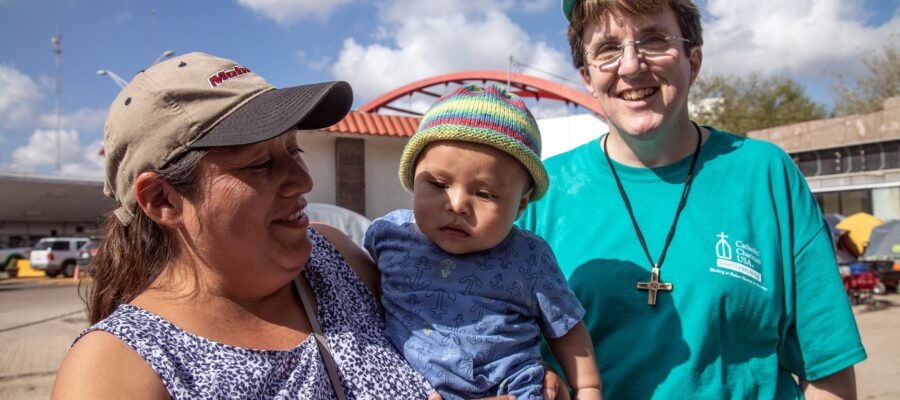
Sisters of Notre Dame de Namur from the US East-West Province served at the US-Mexico border in various temporary capacities from early 2019 until March of 2020.
Summer 2020 Update
In Texas, through early 2020, Sisters were walking across the border in Texas to bring food, supplies and support to migrants living in a makeshift camp in Matamoros, Mexico. Approximately 2,500 people live there in deplorable conditions as they await access to the U.S. immigration process. The arrival of COVID-19 infection is alarming because the refugee families have no conditions for social distancing and hand washing since portable toilets and sinks are for common use and clean water is scarce. Though unable to serve directly at this time, the Sisters send financial aid to key nonprofits to help finance a field hospital with 20 beds, masks, hand sanitizer, food, medicines, and COVID-19 tests. The financial support comes from the generous donations of our friends, donors, Sisters and their relatives.
In Arizona, small churches that received the ICE buses of those seeking asylum have shut down (and few to no migrants are getting into the U.S. All non-essential travel across the border is banned. The truck crossing limits are reducing the transport of Mexican produce and fruits into US and Canadian markets, so all are suffering. The Sisters are unable to enter Mexico or serve in their usual capacities.
Following are some excerpts of the Sisters' reflections on the experience of serving at the border, along with videos and photos. Our Sisters have most recently been walking across the border to bring food, supplies and support to migrants living in a makeshift camp in Matamoros, Mexico. Approximately 2,500 people live there in deplorable conditions as they await access to the U.S. immigration process.
Sr. Mary Alice McCabe, SNDdeN, was profiled for her work at the US-Mexico border in Matamoros, MX in the Global Sisters Report and in this National Catholic Reporter video.
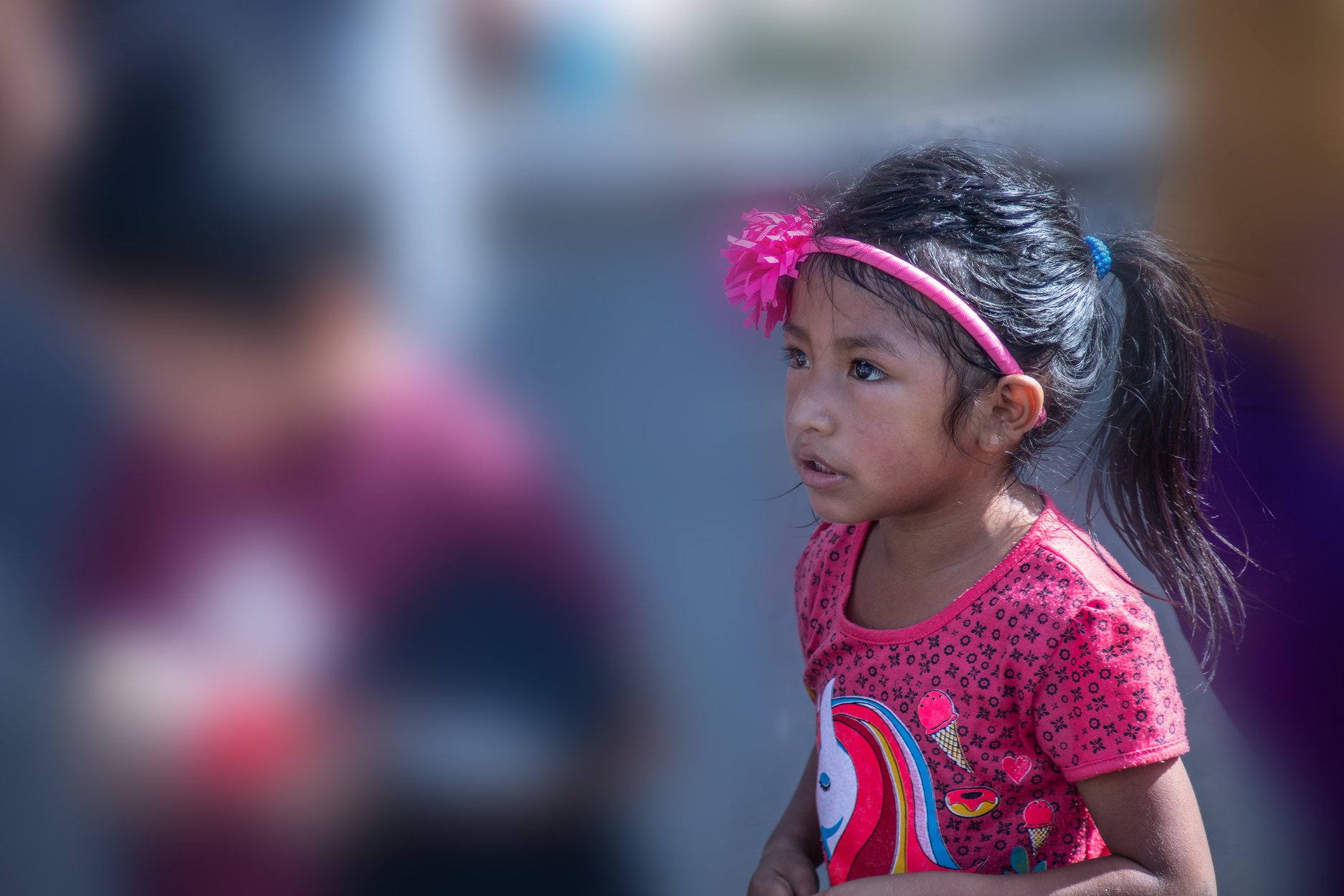
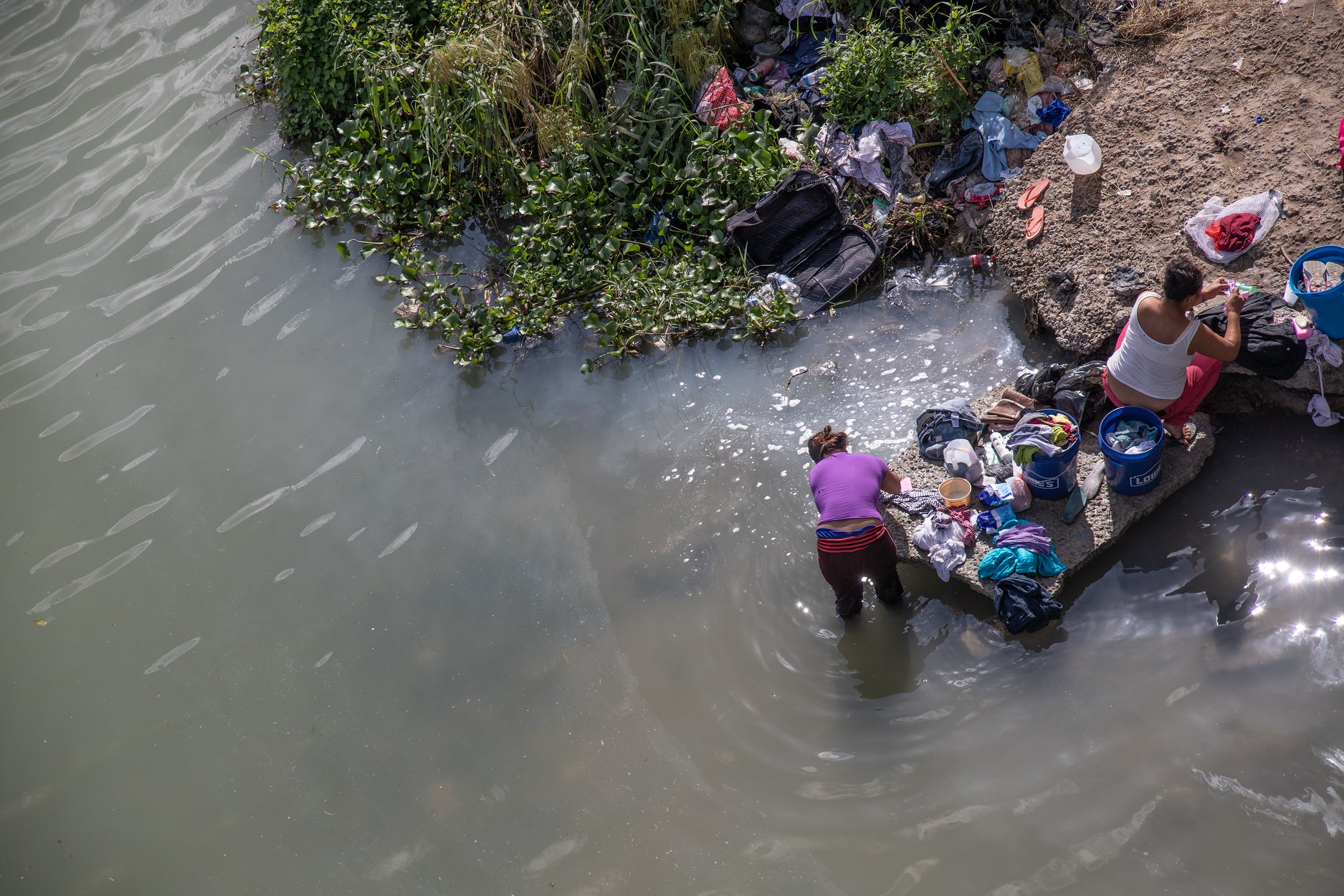
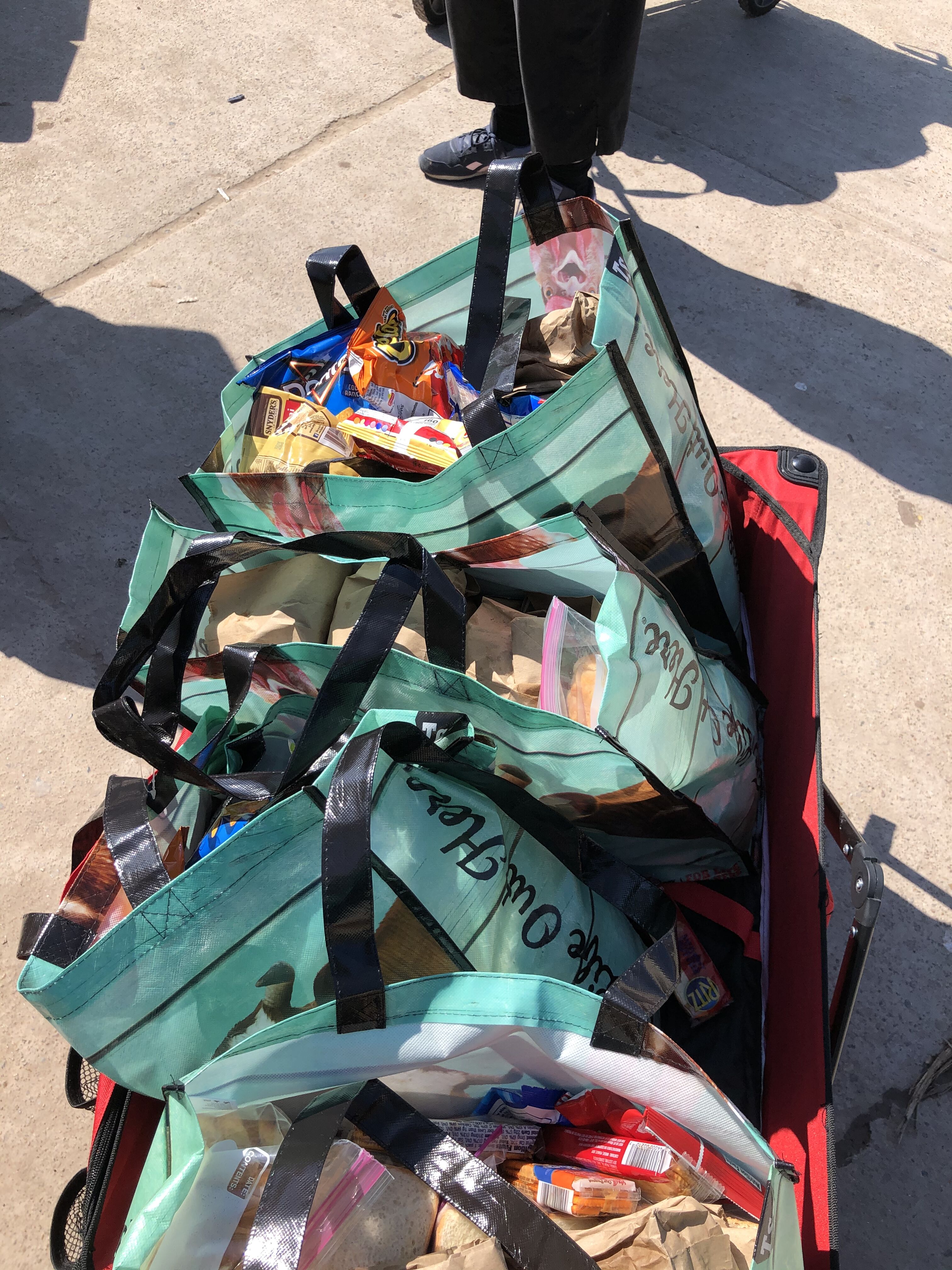
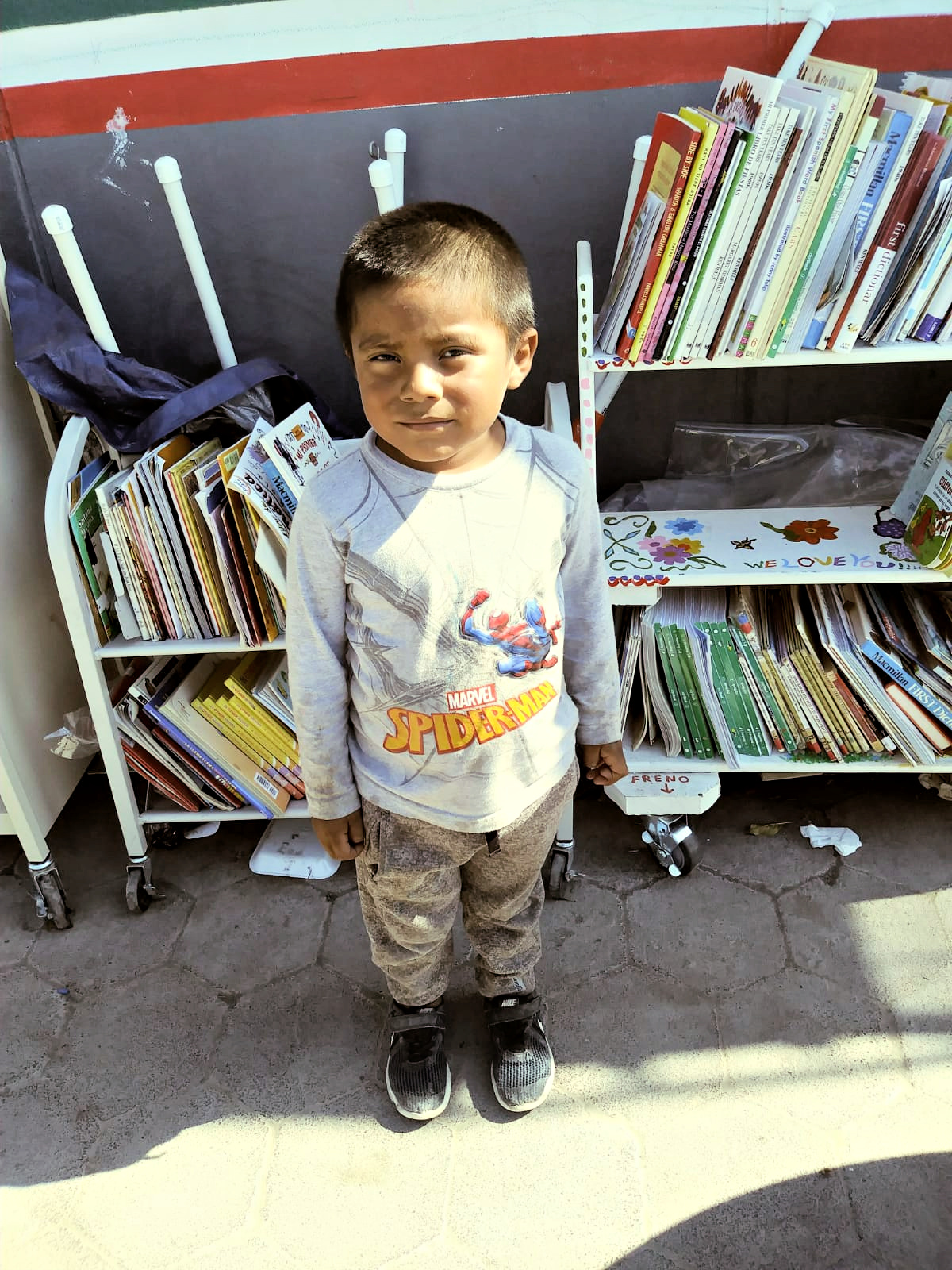
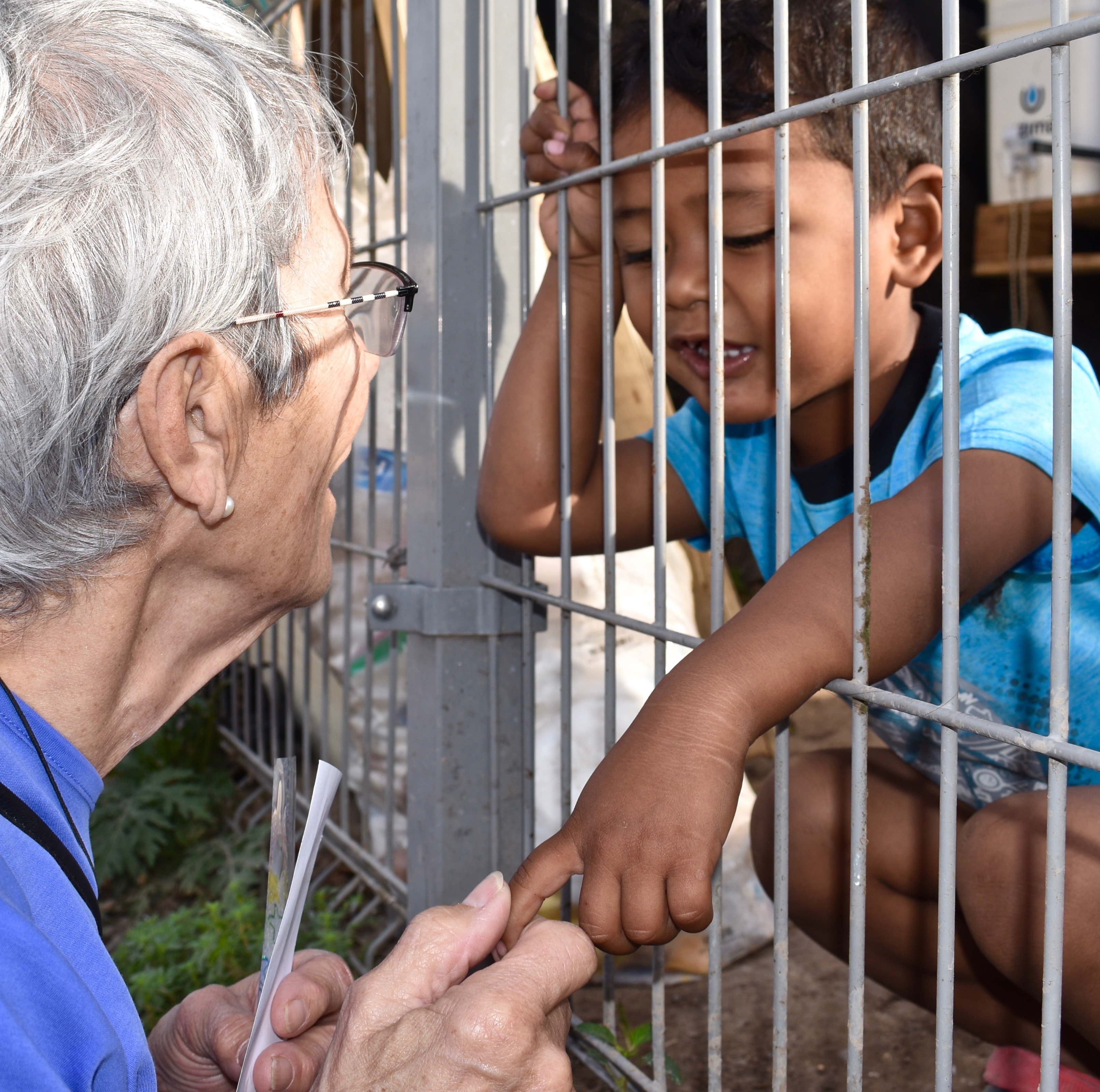
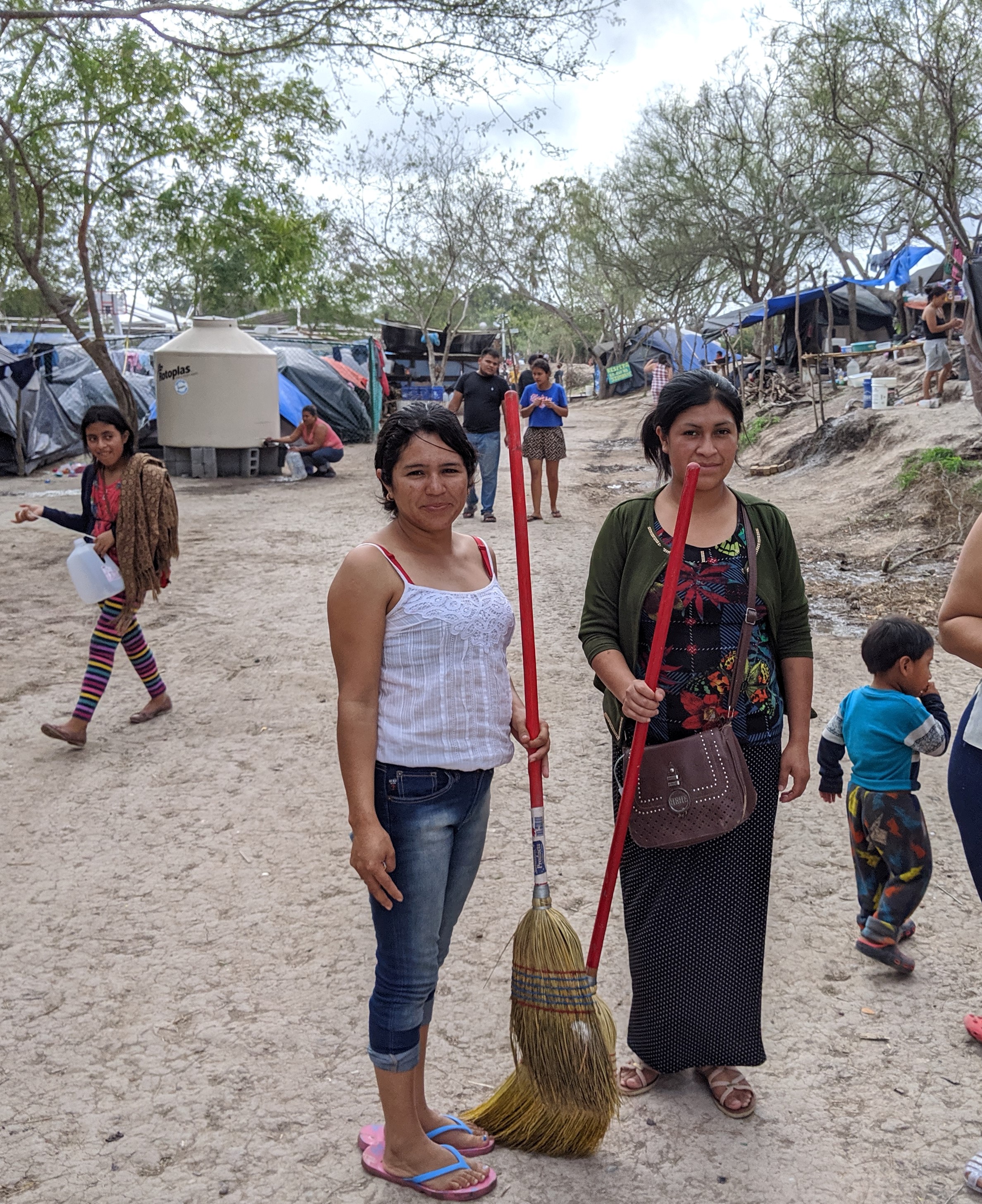
From April 2020 in at the Arizona-Mexico Border
by Liane Delsuc, SNDdeN
As in most other places around the world, the coronavirus has had a disorienting and generally detrimental effect on life in Arizona. Although late to order closures, the governor has declared only online education for the rest of this academic year, churches are providing on-line liturgies and other resources, restaurants are open only for takeout, most parks are off-limits, non-essential businesses are shuttered and hospitals, along with the National Guard, are gearing up for the expected surge of covid 19 cases during the next two weeks. AZ is home to MANY retirees, a vulnerable population.
The small churches in Phoenix and Mesa that received the ICE buses of those seeking asylum have shut down and few to no migrants are getting into the U.S. Some single adults are being dropped at the Phoenix bus station and get to the Welcome Center run by the International Refugee Committee. We are unable to go to Kino to serve at the soup kitchen as the truck crossing where we usually enter Nogales, Mexico has very limited access, although the pedestrian crossing there is still open. All non-essential travel across the border is banned. The truck crossing limits are reducing the transport of Mexican produce and fruits into US and Canadian markets, so all are suffering. Another pedestrian crossing from Mexico into downtown Nogales, AZ has been closed, affecting businesses on the American side accustomed to Mexican shoppers. For more information about what is happening at the Nogales, AZ/Mexico border, go to the Kino Border Initiative website here.
With the shuttering of businesses, jobs are lost and the most vulnerable—those who are undocumented—have no access to social services. Families are stressed. Landlords have been asked to be compassionate and delay rental payments and no evictions are to happen. Non-profits are trying to fill in the gaps with limited funds being stretched, so we are helping some with any donations received.
As a counter balance to this reality, the slowdown time provides relaxing Spring days of sunshine and gentle breezes, birdsong enjoyment and long nature walks. What a Mystery! Cleaning, gardening and mask making for the Children’s Hospital and a center for homeless seniors fill my days. The five of us SNDdeN’s in AZ are well as we shelter in place.
Blessings as we continue this unusual time and await real resurrection.
From January 2020 in McAllen, TX and Matamoros, Mexico
Mary Alice McCabe, SNDdeN
During the month of January, five of we SNDdeNs have continued the work of revealing the goodness of God in a variety of ways here on the Border especially in the refugee camp in Matamoros. Mary Boretti and Eileen Burns invented educative activities with many refugee children of all ages in the camp, creating moments of learning and laughter in spite of scorching sun, and crowded, dusty spaces between the tents.
Jeannette Braun and I sat on boxes with the families in their pup tents while helping them to fill out in Spanish their asylum application forms and to write their accounts of violence and extortion …most often the reasons for why they are fleeing their homelands; Lawyers for Good Government- a probono legal service in the camp has asked for this help.
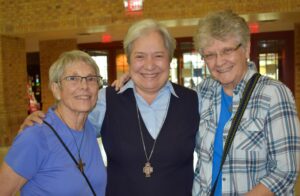
Jon Julie Sullivan with her artist’s eye captured photos of many moving moments and details of daily life in the refugee camp. She brought with her a portable photo printer and was able to give photos to the families who asked that their picture be taken. You can imagine how these simple gifts produced many smiles.
Each of us tries to communicate to you what we see, and feel…as we accompany these people, (well over 2,000), who teach us what victory of the human spirit looks like in the face of dire poverty, cruelty and injustice. They hope, they pray, that the cold, cruel, closed door to the USA will one day open again and welcome them.
During this month, I learned a new and very disturbing aspect of human migration that I had not known before. It involves the migration route of the Angolan and Congolese refugees. They are the new group of refugees who are now arriving at the Humanitarian Respite Center in McAllen. Because they are not from Central America, they do not have to wait in Mexico. They ask for asylum and can enter the USA.
I asked them about their journey and heard shocking stories—unbelievable ones about their migration which in most cases has taken years. Many of them first found their way to South America (Brazil, Ecuador, Chile) where they worked for months, even years, to support themselves. Governments in these countries are now more hostile and situations increasingly violent so they now feel the need to migrate north to the USA, passing through South American countries until they reach Columbia!
In Columbia they face the DARIEN GAP – a forbidding and road-less jungle, the only link by land between North and South America. It is a lawless wilderness teeming with everything from deadly snakes to violent traffickers. This region sees a flow of migrants from Cuba, Africa and Asia whose desperation sends them on this perilous journey to the USA.
One Angolan man told me that it took 11 days for him, his eight-month pregnant wife and seven-year old son to make this dangerous journey through the GAP, which is considered one of the most dangerous migrant routes on the planet. They saw many companions on the journey drown in the river rapids. They saw dead bodies and bones all along the way, remains of people of many races and nations who had died of exhaustion, hunger, snake bites or terrorist violence from drug runners or people smugglers. Many were robbed by the traffickers, held at gun point.
The GAP is dense forest with muddy, mountainous terrain that is nearly impossible to climb. There are no roads or paths, only a flat marshland 50 miles wide on the Columbian side and a mountainous rainforest on the Panamanian side. I asked how they found their way through the dense jungle and they said that other travelers who had gone before them had left signs on the trees…pieces of cloth or clothes or trash, to mark the path. Their shoes rot and their feet are cut and bleeding.
One Congolese father of a family said that his tears flowed as he held tight to his son, clutched his wife’s hand and tried to scale the muddy mountains. They thought they had prepared for this journey but it was far from sufficient. They ran out of food after 7 days, but trekked on with empty stomachs for another 4-5 days. They know they are the blessed ones that made it through and they cry for the majority who die on the way. It was a real eye-opener for me that our Congolese and Angolan peoples have endured and continue to endure such a traumatic migration.
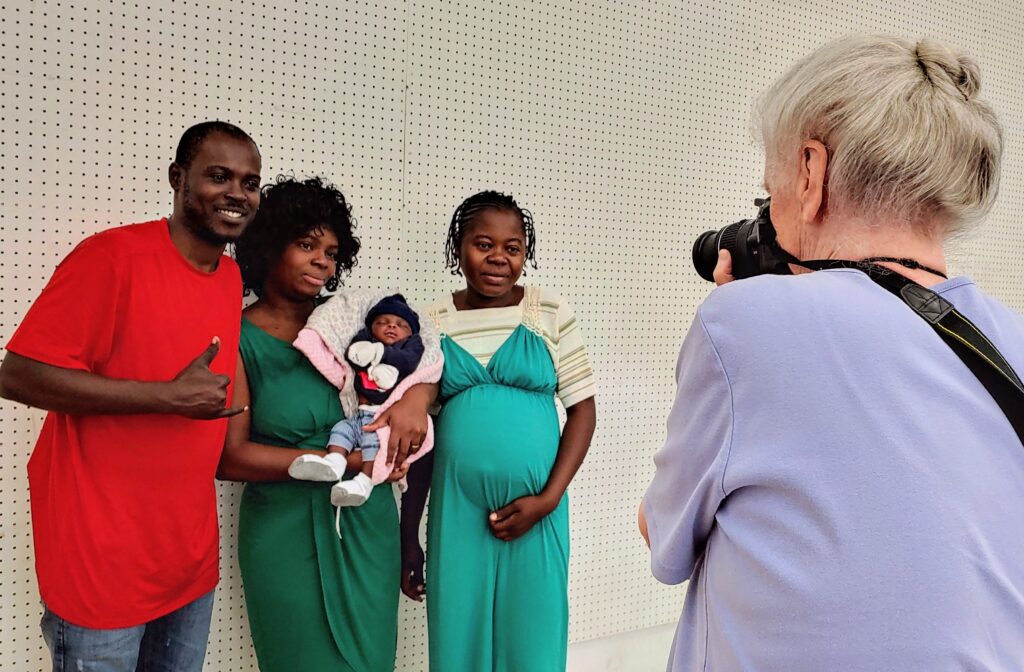
Keep up your prayers, please, because soon heavy seasonal rains will hit this Border region and the refugee camp in Matamoros will be flooded. Catholic Charities and other local volunteer organizations are meeting regularly in efforts to find a solution to this problem which is a direct consequence of our government’s cruel immigration policy that condemns innocent asylum seekers to wait in tent camps in Mexico.
Seventeen members of the Hispanic Caucus of the House of Representatives visited the camp last Friday. Suffice it to say they were appalled at the conditions in the camp that these families are forced to endure.
REFLECTIONS: McAllen, Texas
Jeanette Braun, SNDdeN
As we approached, a huge sign made it real: “Catholic Charities Humanitarian Respite Center: Restoring Human Dignity.” I remember thinking, “Yes, ’restoring human dignity’ perfectly
describes our mission for this journey.
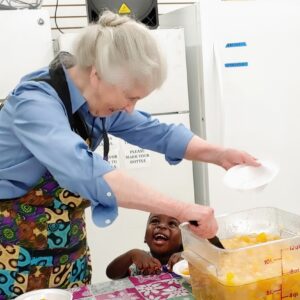
Our first responsibility was to help prepare soup and sandwiches for the 30 or so refugees from Angola and the Congo. Since the current Administration’s “Remain in Mexico” policy (MPP), the number of refugees at the center has drastically dwindled to a few refugees from Africa. The Latin Americans are detained in camps along the border in Mexico. Generous volunteers from around the country continue to come to the center to help in whatever way they can: They entertain the children, visit with the adults, make sandwiches and bring packs of diapers and other needed supplies. Every day, they travel to the Matamoros Detention Camp to distribute these necessities.
Making CONNECTIONS
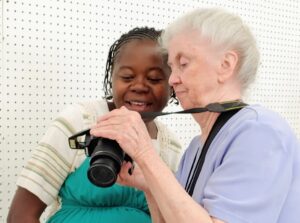
Jon Julie became our “pied piper” with the children traipsing after her, eager to see their faces on her camera’s “photo preview screen.” After asking the first few families permission to take their photos, other parents quickly approached Jon Julie asking her to please take their photos as well! I loved watching the adults smiling at the previews of their family’s pictures on Jon Julie’s camera. The following day, happiness was sprinkled throughout the center as everyone received printed copies of their photographs! Jon Julie’s photos helped make a special connection with these families. This personal gift also helped in showing the refugees how beautiful they are. It was a step toward “restoring human dignity.”
FIRST MORNING in Matamoros
It was stunning to reach the Matamoros migrant camp filled with pup tents covered with tarps and jammed close together in dusty rows. Over 2,000 people are subjected to the harsh conditions of the camp: No running water or electricity; limited portable toilets and makeshift mud stoves, fueled with tree branches. The conditions are deplorable.
Smoke and dust filled the air on the windy day we arrived. Men and women went about trying to make the best of the miserable situation. Children were everywhere playing. There are no schools to date. Older siblings took care for the youngsters, while mothers cooked or washed clothes by hand and hung them wherever they could.
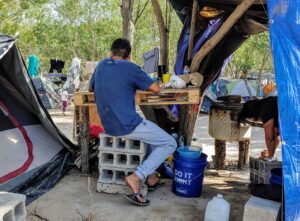
Despite these grim conditions, I saw signs of resourcefulness and creativity everywhere: Stoves are made of mud from right around the tents. Tree and bamboo branches are lashed together with nylon cords to create tables and shelves and to hold up tarps for shade and protection from the wind. Fences and bushes and string tied from one tree to another became clotheslines. A few cinderblocks placed on their sides and a plastic tub were a “pila,” a place to scrub and wash clothes.
BEGINNING: The Personal Journeys with Courageous Women
Mary Alice guided me to a tent, where we were warmly welcomed by Maria and Nora from Honduras. Under the shade of a tarp, seated on wooden crates, Mary Alice, Maria, and Nora and I began our work together. I would write Nora’s responses to the questions on the lengthy draft application called a “borrador.” Listening to Nora’s account of her life was moving. I learned about her family, the attempted murder of her husband, and the extortion and threats to kill her children. Her community is controlled by members of powerful gangs. They use threats and violence to enforce their control: robbery, extortion and murder of their families, friends and neighbors.
Recounting the details of these terrible events was difficult; yet, Nora carried on, wanting to document why it is impossible for her to return to Honduras.
Listening to the women's stories was an intimate experience. Telling of the most terrible moments, their frustration and exhaustion would spill out and so did their tears. Then they would gather up courage and carry on. These are strong, brave women. It has been an honor, a sacred trust to accompany them even for a brief moment on their hopeful journey to find a better life for their families.
Etched on my HEART:
During the 1980s, I was involved with the San Francisco Sanctuary Covenant. This was also the time that our Sisters made our Corporate Stance to Declare Sanctuary to protect, support and advocate the rights of refugees. Nora’s courage and her story stays with me, just as the other refugees and their stories remain etched on my heart from my earlier work. How appropriate for our Notre Dame Family to publicly declare sanctuary since our foundress, Saint Julie was both a refugee and refuge during the terrible political upheaval in her country!
Compassion asks more of us…
“…to mourn with those who are lonely, to weep with those in tears.
Compassion means full immersion in the condition of being human.”
-Henri Nouwen
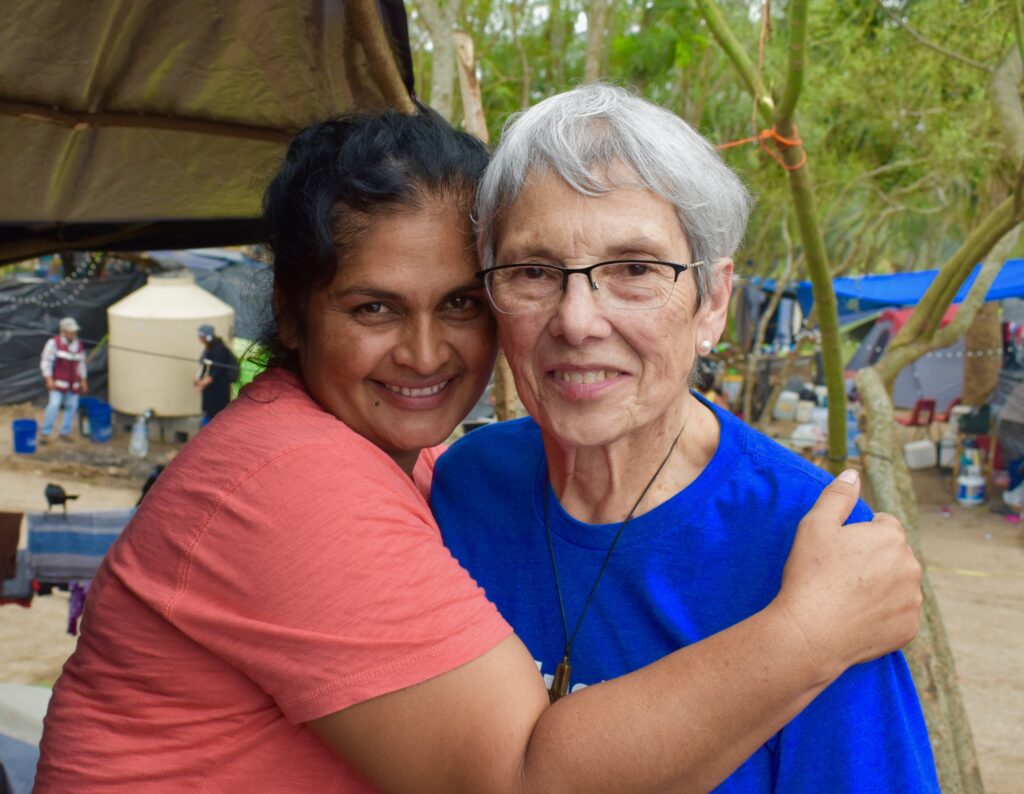
Bordering on…
Jon Julie Sullivan, SNDdeN
Some people are content to be deaf, blind or mute.
Some aren’t.
Some institutions, same things going on.
Some governments, churches, congregations
organize for contentment, but that is not what it is.
“Keep those apples in the cart.”
“Don’t spill the milk.”
“Beware of rotten bananas.”
“Try to get the cherry on top.”
“Expect the biggest slice.”
Then I got to come to Matamoros’ tent-city in Mexico
expecting the migrants to be miserably lethargic
because of all the tragic chapters of their lives.
Our President kept pushing the “pause” button
controlling the process of acquiring asylum.
We began to know there was evidence in the news
of political strategies to move the “pause” to “delete”.
Families were sent back to their countries
to certain death.
Women were sent back to sexual violence, gang rape.
Children were sent back to traffickers or taken from parents, put into cages, or sent on to another detention center and lost .
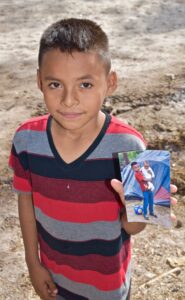
The bridge or the river became the final choice.
Now suicide has become another option.
I knew that I wanted to come to “the border”
to take pictures, and hated the very idea of needing
to see, hear and say something with them.
Oh what beautiful families are here
in multicolored tents.
Children being raised by the village elders looking out
for all of them.
Eight year olds carrying one year olds.
Royal blue tarps on top of tents. Laundry stretched on bougainvillea bushes..onesies, dresses, overalls, shirts, pants and multicolored bras.
Men creating ovens from clay, tables from bamboo, digging trenches around their tents for rain run-off .
Lots of adults with handmade brooms sweeping dirt, clearing their “yard” of any debris.
Bringing photos back to the families the next day was graced by their “Gracias” and a firm embrace.
But I know it is not enough.
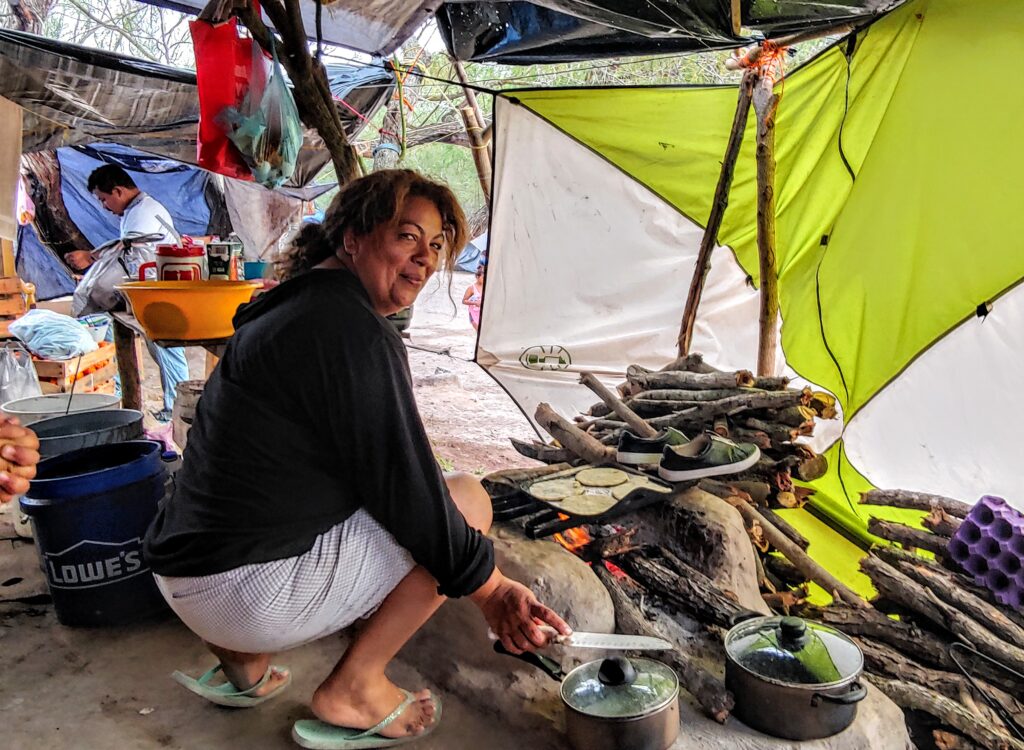
Mary Boretti, SNDdeN, Eileen Burns, SNDdeN and Mary Alice McCabe, SNDdeN
We have had the experience of being with amazing new peoples and have come to a greater understanding of why people have fled their homelands. We do not know all the whys but some reasons have become clearer to us.
In the three Central American countries of Guatemala, Honduras and El Salvador, street gangs infest many towns and villages. Residents are threatened, recruited and extorted. Sometimes the gangs will recruit young athletes because of their physical strength, which would be valuable to their violent objectives. One handsome young man in the tent camp shared he had been a boxer from El Salvador with his compañera and had to flee to escape being recruited.
Another example is of a woman from Guatemala whom Mary Alice met. She made tortillas and would go down the mountain to sell them to support her family. At the end of the day, gang members demanded that she give them half her profits and when she refused, they burned her arm severely. They warned her, if she refused again the next day, they would kidnap her young daughter. She went home, packed up and fled with her daughter.
These masked gangs sometimes pull up to a school and kidnap school age children. These kidnapped children are often sold to organ donor dealers. The gangs watch and control entire towns, which is one of the reasons why parents and children are fleeing.
Another reason people flee is climate change leading to droughts and loss of crops and starvation.
A third reason is the economic situation created by the trade agreements of NAFTA and CAFTA. Transnational businesses such as U.S.-owned Chiquita Banana Company own private land and exploit local labor.
We divided our time between the Catholic Charities Respite Center in McAllen, TX and the tent encampments in Matamoros, Mexico. We joined many volunteers from various states at both sites. These are very different realities.
At the Respite Center, we met women, men and children mostly from Africa—Congo, Angola and Haiti. Many of these fled to South and Central America and are now on the move again in hopes of receiving asylum in the U.S. They are allowed into the US and will soon be on their way to their destinations in the U.S. to await asylum hearings.
When at the Respite Center, we spent time preparing and serving meals, laundering blankets and towels, and playing educational games with the children. The care shown by the guests and the volunteers as well as the faces of the children remain in our hearts and memory.
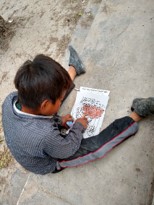
In preparation for our time in Matamoros, we prepared for our educational and playful activities with the children. We also visited many Walmarts and bought out all the blow-up twin mattresses we could find, thanks to the generous donations we received. The tent floors are cement or bumpy dried adobe. The air mattresses provide some comfort.
The people we met in Matamoros are those refused the right guaranteed by international law to seek asylum within the U.S. The new MPP (Migrant Protection Protocol) is an illegal and discriminatory protocol of Homeland Security invented by this administration. It forces those Spanish-speaking (especially Central Americans) to remain in Mexico while awaiting a court hearing where they can apply for asylum.
They arrive at the border after perilous journeys of over one thousand miles. Now they have to fill out an eight page asylum application in English, which requires significant technical assistance. They are given a date for an asylum hearing. On that date, they are brought across the border into the US where they see a judge on a screen from somewhere in the US. They may be told to redo parts of the application and reapply or be given a date to return for another hearing months away. Then they are returned back to Mexico as they remain in limbo.
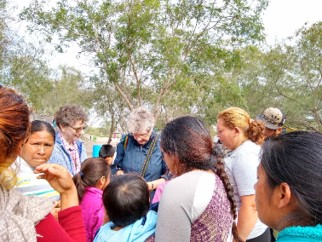
The scandalous part is that these courts are merely an MPP sham … “ just one component in the well-oiled machine overtly trying to end asylum in the country” according to RAICES (Refugee and Immigrant Center for Education and Legal Services). We met people in Matamoros who have already gone to tent court hearings by video two or three times and are still barred from entry into the U.S. The amazing thing is to see how they try so hard not to lose hope.
Brownville, Texas [the city across the border from Matamoros] is an hour by car from our mobile home in Alamo, TX. We arrived, loaded our wheeled carts with the mattresses and our bag of supplies for our street school. We crossed the long bridge passing through Mexican border control and entered a very different world. Immediately we saw a myriad of tents placed side by side with little space between them. People swarmed out from everywhere as Mary Alice called a mother’s name to receive a mattress. Others added their names to her list for the next trip.
We visited many people along the way. One family welcomed us into their tent and we were amazed at their creativity and ingenuity. They created a stove out of dry river mud, a table from a pallet and a frame for their tarp from branches tied with ribbons and plastic bags. As we travelled, we also saw many families crowded in little tents sleeping on the dry, hardened adobe earth. We met a Honduran family, newly arrived, with a plastic line tied to a rock trying to fish in the polluted Rio Grande River. There are free stores in tents in the camp where the refugee families assure that distribution of donated supplies are fair. There is a little tent restaurant where four families pool resources to open a take-out restaurant under a tarp.
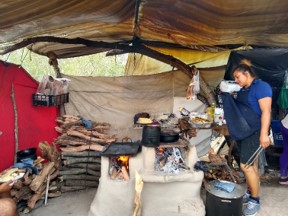
Throughout the camp, there were many attempts to create beauty and comfort in the midst of such poverty. Goodness is visible with many trying to meet the needs of the people… a makeshift medical center, a Legal Resource Center, many volunteer groups providing food and supplies. We were also very impressed with the care the people showed to one other.
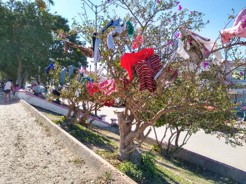
In a few sites in the camp, Mary and Eileen gathered the children to play some activities to practice the alphabet and simple math in English. We had coloring books, bubble relay races and traced their journeys on a plastic blow up globe.
We felt welcomed and strangely at home among these impoverished yet resourceful, trapped yet hope-filled people.
From November 2019 in Phoenix and Nogales, Arizona
Margaret Campbell, SNDdeN and Liane del Suc, SNDdeN
This month has demonstrated the uncertain, constantly changing reality of immigration enforcement in our country. For several weeks, City Square Church in Phoenix has received only three or four families at a time from Mexico, Brazil and Russia. No families were coming in from Central America, possibly due to the ‘Remain in Mexico’ policy. Yet, on Thanksgiving morning we had two families from Honduras and one from El Salvador. About 15 volunteers arrived at City Square on Thanksgiving morning to help feed and clothe these families and later, three host families welcomed these ‘strangers’ to their homes for Thanksgiving dinner while they awaited transport tickets to be arranged. One more sign of Goodness in the midst of such injustice.
A mother and her ten year old son arrived after a month of travelling from El Salvador to Mexico. Another mother and her two girls, 4 and 7 years of age, left Honduras while she was pregnant. She and her daughters crossed a river in a raft and border patrol sent them to Mexicali. The mother gave birth in Mexico and came to Phoenix with her one month old little boy and her two daughters. A family of four arrived from Honduras after 5 months, having worked along the way to be able to continue the journey. While in Mexico, the father explained that they were kidnapped and beaten, possibly by Mexican police. They sought asylum and were now on their way to Houston, Texas.
The trip to Nogales on Black Friday gave us another look at the reality. Since it was raining very hard, few people arrived at the comedor (dining hall) in the morning. We saw only men and older boys who had recently arrived at the border and were waiting in line to receive their numbers for their initial interview at the border. It generally takes one to three months for asylum seekers in Nogales to have their first hearing. That is apparently faster than in other ports of entry where it can be six months or longer. Nogales has a number of shelters available and some families join together to rent an apartment or house while they are in Mexico awaiting their interview.
Because there were not many at the comedor, we were asked to go across the street to the new Kino (KBI) building to sort clothes. We had had a generous donation of very warm blankets and baby quilts, so those were added to the clothes room. We joined a grandma and her son and daughter’s family of five children (from San Francisco!) as they sorted clothes. It was a wonderful example of how to teach children to be thankful and generous in service the day after Thanksgiving.
From November 2019 in Matamoros, Mexico
Nancy O’Shea, SNDdeN
"It Takes a Village"
I recently had the opportunity to spend a week in McAllen, Texas going regularly over the border into Matamoros, Mexico. The Sisters of Notre Dame de Namur have a project in McAllen where we can be part of the team helping immigrants at the border. It was a true privilege to be there, serving our brothers and sisters, young families for the most part, who are trying to find a better life for their children. The living conditions are difficult…..living in small camping tents within inches of the next tent, and on cement floors. It was hot when we were there, but we know the cold and rain will be coming soon.
Of course, the faces of the immigrants told the story of the hardships they had endured and yet, the hope they have for gaining asylum in the United States. However fleeting that reality might be, they still have hope. The thought of returning to the dangers they left is too much to consider.
Another group of people also spoke to me of hope. These were the volunteers we met from all places in the United States. They came from all walks of life and with different motivations, I’m sure…but behind everything was the desire to help other humans. That in itself is inspiring.
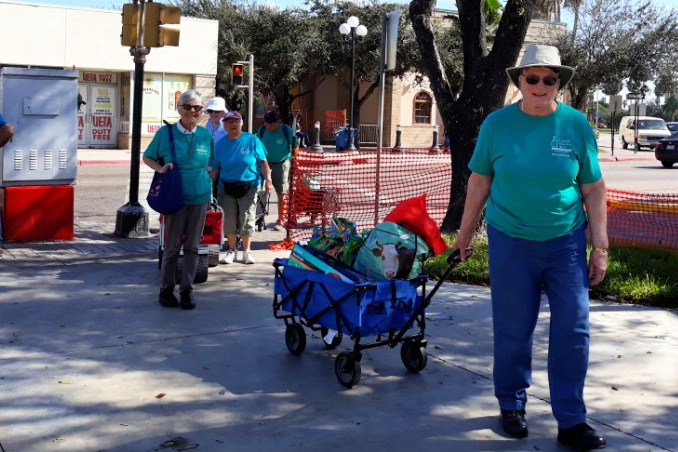
There were some who live in the McAllen area and come each day to volunteer at Catholic Charities Humanitarian Respite Center of the Rio Grande Valley, where we made 300 sandwiches each day…and packed up needed supplies to take over the border. Other locals came when they could…one was a college student studying to be a bookkeeper…coming on days when she didn’t have a class until late afternoon. Willy was there each and every day, hauling things over the border. Sherry came daily to help with the organization of the work at Catholic Charities. There were some men and women who came from South Carolina with a Methodist Church group. They were trying to educate themselves about the situation at the border: what is causing it, what needs to be done with our laws, and just wanting to lend a helping hand.
There was Bob, a retired Coast Guard officer, who comes from the middle of the US whenever he has eight or nine days in a row he can keep free. He pays for his flight, rents a car, and gets a place to stay. He is a great organizer and is able to relate easily with people. This was his fourth trip, and he promised more.
There were two Sisters from communities other than Notre Dame, in their late 70’s. Both Maryann and Pat were from the East Coast. They saved some money, rented an Airbnb apartment for two weeks, flew down to Texas and rented a car…they came each day to the Catholic Charities Center to help in whatever way they could. They connected easily with the SNDdeN’s and learned the ropes about making sandwiches and taking them and other items over the border into Matamoros. We worked side by side with them during the week we were there. They even invited us over for dinner one Saturday night..the gifts of sisterhood were alive and well!
There was a member of the group “Angry Tias and Abuelas” who came in to sit with a family who had been cleared by US Border patrol to travel to a sponsor in the United States. She oriented the frightened, but excited, young couple, to the route they would be taking on the Greyhound bus—35 hours to San Diego. She gave them a blank map of the United States and highlighted their path and named the stops they would make. Each was also given some food and necessities for their journey, and a small toy for the child. She answered questions and tried to allay their fears, coaching them as to how to get information or help at the bus stations through which they would pass.
Over in Matamoros one day, I was part of a conversation between Jackie, an older woman from North Carolina, and Anthony, a young man from Chicago. They just met while sitting there. He told of how he had a car full of coats that he tried to bring over the border but was refused because they weren’t new items. He would have needed to pay a fine to get them into Mexico. Jackie had brought money to buy some items after she had a chance to assess what was needed. Together they decided to walk to a local store on the Mexico side and purchase coats and jackets there, bring them to the Center where they could be available when the weather changes. Anthony had his credit card and muscles to carry the coats; Jackie had cash back at her hotel in Texas, so she could reimburse him later in the day. Off they went on their shopping trip, which I’m sure was successful. A few obstacles didn’t deter them from helping others.
I didn’t meet, but heard of, ‘Team Brownsville’, a group of citizens from that city who fix and serve a meal in Matamoros four or five nights a week. And there is Kelly, a woman who volunteers each day as an office manager at an ‘ad hoc’ center in the Matamoros tent camp, keeping services moving as she responds to the various needs of people who come in search of help. Her comment was: ‘As long as the immigrants are here, this is where you will find me.”
With all the pain and suffering represented in the faces of the immigrants and in the telling of their often horrendous stories, the goodness and generosity, the will and the determination of these volunteers was a testimony to a real goodness of people who want to reach out to their suffering neighbor, knowing their only reward is a smile and a ‘Gracias’. And that is truly enough!
Rita Raboin, SNDdeN
My Reflections of the Border Experience – Immigrants’ Solidarity Among Themselves, Nov.11 – Nov.22
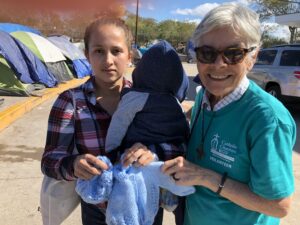
This was my second time being privileged to accompany the immigrants at the Border. However, this time the support was characterized by crossing the bridge from Brownsville, Texas to Matamoros, Mexico. New restrictions enforced through the Trump Administration’s Migrant Protection Protocol, is forcing asylum seeking families to be held in Mexico. The Humanitarian Respite Center in McAllen receives a few families from to time who were able to cross into the U.S. Ellen Dabrieo, Nancy O’Shea and Gerry Stanton, for her last few days, and myself comprised our team.
Some days we would go to the Respite Center, make the sandwiches and gather needed supplies for the migrants. We would then drive an hour to the International Bridge and cross into Mexico to distribute this snack and other necessities. What was striking for me was how the Sisters had discovered responsible people as point persons to distribute particular items like tents, tarps, knitted infant sets and other much needed goods to people who, when they saw us, immediately stood to converse and find out how they could help us. We could trust them at different localities to get these items to the people who needed them. They had already developed a system to distribute these goods to those in most need.
The same trust and responsibility exists at the Resource Center [in Matamoros] where Kelly Escobar, whose grandparents were born in Mexico, would hold items and see who had newborn babies, etc. It was so gratifying to see this networking going on as the number of families is huge with hundreds and hundreds of families under pup tents. I suspect that Ellen and others on the Coordination Team have helped make these contacts or other volunteers along the way.
However this connection was born, it is an enormous help to reach the folks who have specific needs. These contact persons were courteous and understanding, generous and in solidarity with families who are in a similar situation as themselves. I was so touched by this openness of companions on the journey. This is not to romanticize a highly oppressive situation caused by our Government but to underline the rays of hope that the people are for each other in an otherwise isolating experience of interminable waiting.
The families in Matamoros and thousands of immigrants throughout the world are in so much need of prayers and dramatic policy changes to welcome them into the diverse countries throughout the world, including ours. What I saw among them in these simple instances, manifests an openness to help each other whenever that is possible. I always feel privileged to be among these families and am grateful to Notre Dame for this opportunity.
Gerry Stanton, SNDdeN
"Christ is always with us, always asking for room in our hearts…He made heaven hinge on the way we act toward Him in His disguise of commonplace, fragile, ordinary humanity.” —Dorothy Day
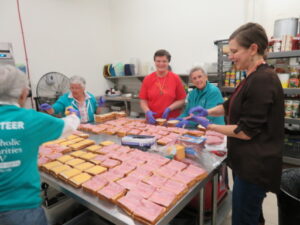
For over thirty years I have been ministering with the Refugee and Immigrant Community. For the last two weeks I was privileged to be with the refugees in Matamoros, as well as a small number who arrived in the Humanitarian Respite Center in McAllen, Texas.
I saw the Face of God smiling broadly as we greeted each other bringing much needed supplies of toilet paper, soap, diapers, lip balm, razors, feminine supplies, dolls, hats and gloves and YES, sandwiches and milk
I saw it in the anxious look, the worry and concern, as many waited to meet the Lawyers 4 Good Government at the Resource Center in the migrant camp. Here Ellen [Dabrieo, SNDdeN), MaryAlice [McCabe, SNDdeN], and Rita [Raboin, SNDdeN], were able to assist families in filling out the asylum forms that the Lawyers 4 Good Government will pick up and prepare for their court hearing.
There are many volunteers working to alleviate the suffering caused by the Administration’s Migrant Protection Protocol (MPP) which forces asylum seekers from Central America to wait in Mexico for their court hearing. The Face of God beams through these women, men and children. Their fire for justice and compassion is palpable and contagious.
I feel honored to be a part of this effort. Organizers are so grateful for our presence there. They say, "The Nuns” will be here – we can count on them.
I know that you, too, will see God's Face in these beautiful people.
Marie Prefontaine, SNDdeN
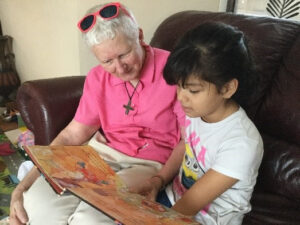
"Sometimes We Need to Hear a Bit of Good News"
On Tuesday, my first day in Matamoras, Mexico, I wandered among the many tents pitched along the international plaza and came upon a sole African woman sitting on the cement sidewalk near the Federal Mexican Immigration building. I introduced myself and said hello. Her first pleading words were” I only speak English!” to which I replied, “that’s all I speak also.” She sat there waiting for her number from the officials in the Federal building. Over the course of the next few days, I heard her story.
Sham is from Uganda where her husband is in jail (not certain why). She is eight months pregnant with a child conceived by rape. She has 2 children—Trey, a rambunctious four-year-old boy and Jasmine, a darling typical two-year-old toddler with a gorgeous smile. Sham and her children traveled from Uganda to Ethiopia, to Belgium, to Argentina, and came through Mexico where they are now detained. Eventually, I discovered she has a sister in Des Moines, Iowa – her desired destination.
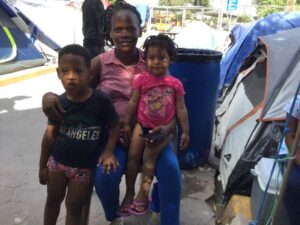
Like so many of the asylees, she and her two children live in a small tent near the international bridge. She had a friend in a neighboring tent–although language barriers were difficult. On Wednesday, I spoke to Charlene, the recently arrived attorney from Lawyers 4 Good Government, about Sham’s story and her isolation of language and ethnicity. Charlene met with her on Thursday. Gerry watched a “crying for her Mom” Jasmine in the Resource Center waiting room. I watched Trey outside since he fought with the other children in the Center. I realized Trey’s known aggressive behavior came out of frustration. He so tried to be the “man” of the family in caring for his Mom, yet is frustrated with an inability to communicate. He spoke his local African language, a bit of English since he’s too young for school and learned some Spanish words during his 2.5 months at the camp.
On Friday, Sham told us they might leave the camp sometime next week. Some hopeful news! On Saturday, we needed to find Sham for a medical appointment. Success came quickly, but then discovered the doctor only spoke Spanish. Luckily, an English translator was found. Once again, Gerry and I were the abuelitas (the little grandmothers as the people called us) for Trey and Jasmine. Following the exam, Charlene met with all of us. She told Sham to go pack her things, wait at her tent and someone would be there in 1-2 hours to walk her over the bridge! What amazing news from Tuesday to Saturday. I was not quite certain how it all came to be. Diapers, powdered milk, clothes and socks filled the suitcase and the children’s backpacks. Mom had a winter coat (it was quite cold in Matamoras), but the children only had their sweaters. We said goodbye as they sat at their tent ready to go, like Israelites leaving Egypt hoping to enter their promised land–Des Moines, Iowa.
It was not until the following Thursday when Gerry was able to get back to the Resource Center in Matamoras that we learned they entered the United States on that Saturday and are probably in Des Moines at this writing.
Good News for one small family to start a new life after a very long journey. God is so good.
Ellen Dabrieo, SNDdeN:
Do you remember seeing immigrant families in cages wrapped in Mylar blankets? Do you remember our accounts of helping these immigrant families when they were released to the Humanitarian Center in McAllen? That was in June and July. We have not seen those pictures since then. Where have all the families gone?
In August, the Trump administration initiated a new policy to deter families from seeking asylum here in the USA. It is called the Migrant Protection Program (also called the Return to Mexico Policy). All asylum seekers coming across our southern border are being returned to border towns in Mexico to await their court hearings
We are now assisting families in the asylum camp at the base of the international bridge between Brownsville,Texas and Matamoros, Mexico. We do not know if there is an exact count of just how many families are there. The last number we heard is 1600, and more are arriving every day. They are sheltered in small pup tents donated by compassionate Americans from all over the country. This past week a cold front dropped the temperature from a daytime 80 to a night time 45. It was very cold in those pup tents.
The Matamoros city officials offered to take families to a stadium for shelter. The families did not want to go for fear that they would not be allowed to return and would not have transportation to their court hearing. This deep fear shrouds their deep hope of a new life here among us.
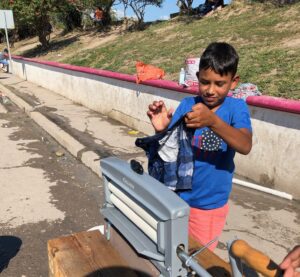
In the midst of this, we have found families striving for some sort of normalcy amidst this chaos. Their creativity knows no bounds. The city has given them some cement sinks and running water to wash their clothes. There are even a few hand turned wringers. The women hang the clothes on a fence or from branches of trees to dry.
Across a section of the camp, we saw small ovens made from clay-like mud dug up from the bed of the Rio Grande. The families have cut branches to make wood fires for cooking. We saw women crouched before these small flames preparing tortillas, rice, frying chicken. We saw one man who was making a table from bamboo-like reeds he found growing along the edge of the river. Another man found a slab of flat rock and with the help of three other compañeros hoisted it up on to four poles to make a table. We saw men and women sweeping the small area around their tent … sweeping the floor as it were! Striving for normalcy amidst chaos.
All of these families are fleeing terror, violence and hunger. A man from Honduras told us that his small vegetable farm was confiscated by one of the gangs and is now seeded with marijuana. A young Guatemalan mother told the story of fleeing because her 15 year old daughter was being threatened by a gang member who had already tried to sexually assault her. These parents are seeking a safe environment for their children, a good education, and an opportunity find work to sustain their families.
The gospel today proclaims Blessed are the poor in spirit. They are blessed because they are the ones who mourn, who are humble, hungry, merciful, promote peace and are persecuted for their pursuit of justice.
From October 2019 in McAllen, TX and Matamoros, Mexico
Ginny Scally, SNDdeN:
My experience at the Border at the end of September was very different from the experience I had in late May. In May, the Respite Center was filled daily with more and more immigrants being released from the McAllen Detention Center. It was at @ 500 when we arrived and within a week that number had increased to closer to 700. Families were in and on their way to their sponsors within 24 hours, having had time to be connected with relatives, to schedule their departures and to eat, sleep, shower, and change clothes.
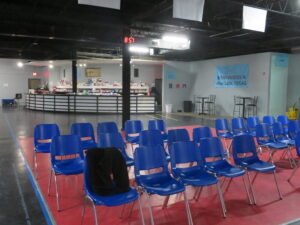
Since that time, the Respite Center has moved to a much more spacious location, with a local address literally right across the street from the Greyhound Bus Terminal with travelling immigrant families in mind. Now the Respite Center stands EMPTY and waiting for all practical purposes!
President Trump has gotten the Mexican government to agree to allow the immigrants to wait in Mexico for their final screenings. It also seems that the deliberate intention of our government is to delay and delay and delay any final decision re legal entry into the U.S., hoping this hardship will encourage immigrants to return to their own countries regardless of conditions there or the “credible fear” asylum seekers have. In the meantime, there are now hundreds of women, men and children crowded in, as close to the Mexican Border Station for protection from cartels, etc. as possible. The majority of the people here have little if any money for water, food, shelter, change of clothes, etc. since most of what they carried initially was taken away from them at the time of their first interview. Having been sent back to Mexico then, they have to wait for weeks before their next hearing. It’s just plain cruel and heartless.
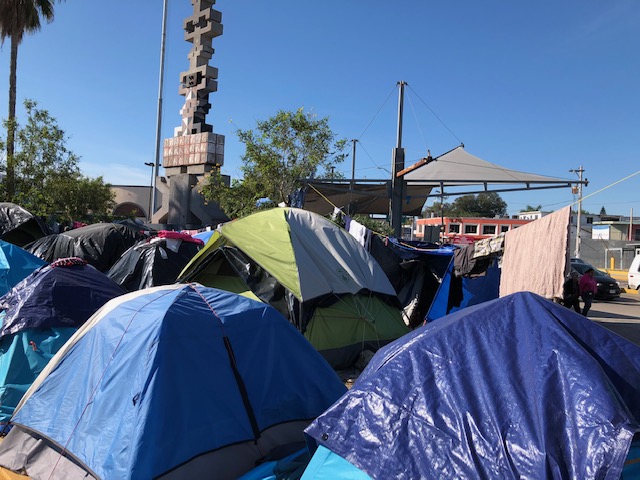
On the other hand, some of the people we met were unbelievable. Volunteers and Staff at Catholic Charities Respite Center gather daily to prepare cart-fuls of snack bags with sandwiches and water, toiletries, toilet paper, small games for children and clothing. Sometimes those volunteers are families who want to help. Sometimes they’re teens who come. Sometimes they’re people from across the States who just need to DO something to say “This is not who we are!” Driving to Mexico, pulling the carts in 98 degree heat, hoping the Border guards will allow them in, distributing these simple things and talking to the people…all ways of putting their faith into action, while hoping they offer a different face of the American people.
And people respond, both immigrants and neighbors who see what is being done and so appreciate it. One afternoon on our way home, we stopped for a Dairy Queen. A young woman named Lucy with a small baby recognized our shirts. She came over to us, offering us her DQ coupons, saying thank you for what we were doing… Jose from El Salvador shared his story and asked for help to prepare for his meetings. Two young girls just wanted to be recognized and affirmed. Children gathered with us and they read the Spanish story books we brought to one another. One shared, small, cold bottle of water quenched the thirst of 3 adults and 3 small children. It reminded me of the multiplication of the loaves and fishes.
On Sunday the Bishop of Matamoros, Mexico offered an outdoor Mass among the people. He was short of stature but had an unending, gentle smile for each one he greeted. In the middle of the Mass, the heavens opened and it poured for about 20 minutes. While the altar itself and the Bishop and priests were under a cover, everyone else just stayed in place, being drenched, while continuing to sing and pray. Lectors, musicians, instruments, music, all the people just kept on keeping on. The sun will come out. The heat will return. Everything will dry and all will be well. And it was. The Shepherd was among his people, come rain or come shine. What an example! What an experience! What a heartbreak overall.
Kathy Gallivan, SNDdeN:
What a difference a few months makes and sadly, things are much worse. While the new respite center in McAllen is spacious, well stocked and ready to welcome new immigrants, the center is almost empty. In late May we were welcoming 500-700 men, women and children a day. This time, 14 was the higher number of people at the center during the week we were there.
The people we met are all huddled at the International Bridge in Matamoras, Mexico; one of the many crossing points from Mexico. Hundreds of them are living in pup tents or out in the open. Thankfully we were able to walk over the bridge bringing basic supplies in wagons. They are so grateful for the simplest things; water, snacks, and children’s clothes; until we were told by the Mexican border patrol that we could no longer bring clothes!
The people are waiting and waiting for a meeting date (via video) to plead for asylum. Some have dates as far out as January. They will wait at the bridge until then or return to the country they fled. The largest number of people seem to be from Honduras and many from Guatemala, El Salvador, Mexico and now Cuba.
Amidst the utter poverty and difficult conditions, I also saw the goodness of God reflected in so many ways. There are amazing volunteers in McAllen; some of them permanent volunteers who come almost every day to help with whatever is needed. Thank you; Sr. Anne Connolly RSM, Willie, Megan, Alma, and so many more. You are an inspiration. A mother and her son came on the weekend willing to do whatever was needed. And then there was Joe from Massachusetts, a former Maryknoll priest, now married with four adult children. He was there for a week, paying his own way, just to help in any way he could.
I was also struck by the kindness of the immigrants themselves. One young man invited me under his tarp during a rain shower and another little girl picked a bouquet of flowers for one of the volunteers.
There were also little rays of hope as a young mother waited at the respite center while her newborn daughter remained in the hospital with a cardiac condition. Once he is released she will join her husband and other child in Kansas. And a family of five somehow got to the respite center and left the next day to join relatives in Florida.
I cannot end without thanking our East West team for their support of this ministry and giving so many of us the opportunity to see up close the plight of our immigrants. And, of course, a thank you to Ellen, Mary Alice, Betsy and Judy for your ongoing commitment to facilitating this project.
Betsy Flynn, SNDdeN:
As we entered the almost empty Respite Center in McAllen, Texas we were told that the huge numbers of migrants whom we welcomed to the United States were no longer being dropped off at the Center. It took awhile to figure out where the migrants were, but soon we realized that no longer permitted to enter the states, they were dropped on the other side of the border, in Matamoros, Mexico where they were forced to take up residence at the bank of the river under the International Bridge.
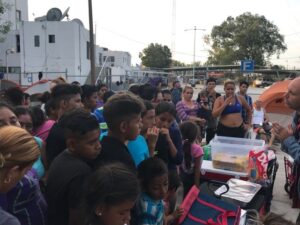
I remembered that one of the important events in the life of Dot Stang and the Brasilian Province was when she and Bequi decided to follow the farmers in Coroata, Marahao to new land made open by the Transamazon Highway. I believe that our finding and following the migrants to the Tent City brings new challenges and new life to our ministry in McAllen.
There are more than 500 asylum seeking migrants forced to camp out by the river under the International Bridge separating Brownsville, Texas and Matamoros, Mexico. They choose to wait there instead of making the long difficult return to the countries they have left because of the life threatening experience. The organization of the Brownsville communities is the life support of the tent city. The people use the river for washing clothes and bathing. Groups are organized to bring 2 meals each day, water, tents, diapers, toilet paper. These items are brought over the bridge with difficulty and distributed daily. Some needed items are not permitted to be brought over, for example, clothing. The organization, faith and respect of the Brownsville citizens inspires hope. The words of our president, however, are shameful and cruel. He wrote saying he would like to stock the river with crocodiles and snakes, and shoot the migrants in the legs.
You have read the reflection of Ginny on the Bishop’s mass. I participated in the mass seated on a wall with a young woman I will call Gloria and her 10 year old son from Honduras. It was 1:30 or so in the afternoon, and she had just been dropped off by ICE and left to wander into the mass of tents to find a place for food and shelter. She started to share her story. She is from Honduras, forced to leave because of threats on her life. She was sequestered for two days. The coyotes wanted her cell phone to call her family in the states and demand $8,000 for her release. She had no phone because it had been stolen, so they left her in the wilderness.
Border Patrol picked her up, and after spending time in the holding space, she was brought to Matamoros, Mexico to await a hearing date. The Border Patrol told her son that the police in the USA would slit his throat if he got there. They had nothing, had not eaten for a day, and they were tired and discouraged. About that time Louie, another volunteer, came by. He had come with us from McAllen and I knew he would know what could be done. He listened with quiet attention as she and her son told the story again. Well, one thing for sure he said, “I will take her to get some food. They are very hungry.” She asked me to watch her small plastic bag, while they went with Louie.
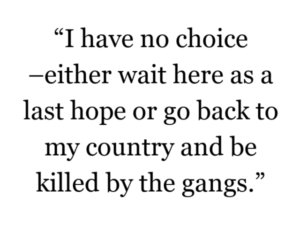
I continued sitting on the wall, praying with gratitude for Louie whom I considered an angel. So then to the empty space left by Gloria and her son, comes another man, we will call Jose with his daughter and they sit for awhile. He tells me that his family traveled together, he, his wife, and two daughters. Some how they got separated, the husband with one daughter, and the wife with the other. His wife got through, but he does not know where she is, whether or not she made it to the relatives who offered to sponsor them. He has a hearing date for Oct 23. He had a tent and he showed it to me. It was right in front of where we were sitting. Six people were sharing that small tent. I asked him about the process for getting a tent. He said people buy them or get them when someone leaves. I asked him if he could help Gloria. He said his tent was already crowded but he could get material to cover the hardness of the cement and she and her son would be safe near them for the night.
About that time, Gloria and her son returned, with food to sustain them. I introduced Gloria to Jose, both from Honduras. Come to find out, she is an emergency room nurse, and he a college graduate, teaching in grammar school. They were conversing when all of a sudden the heavens opened and there was strong wind and a deluge of rain. We scrambled to get refuge from the rain. Though all were drenched, Mass continued as if nothing unusual was happening. We got separated in the crowd but I knew Jose was another angel and that Gloria was in good hands. And that we are all in the company of angels.

Our awareness is heightened each time we hear from our Notre Dame sisters. Continued prayers and supplies are being sent and hopefully getting to the asylum seekers for some sense of peace and outreach. The outrage of 'the wall' continues to paralyze our minds that this can possibly be! Thank you for mobilizing with deep compassion.
Thank you for sharing these stories. For those of us that cannot be there it is so important to hear first hand what is going on. I very much wish I could be there handing out supplies and giving hugs and smiles. Thank you for sharing the amazon wish list. What an easy way to get supplies to the Humanitarian Respite Center. I will pass this information along. God Bless you all and our brothers and sisters you are serving.
Joanne Thompson, AND Belmont, Ca
Thank you so much, Sisters of Notre Dame and all the volunteers at the border. How can we contribute specifically to the Humanitarian Respite Center?
Mary,
Thank you for your caring response.
You can make a donation at this site: https://www.catholiccharitiesrgv.org/HumanitarianRespiteCenter.shtml
Thank you for your physical presence along the southern border, for witnessing the suffering and responding with open hearts. Thanks too for sharing stories of what is actually happening in McAllen. I loved reading about Peggy Cummin’s conversation with a border patrol officer – I can visualize that encounter. Deep peace to all.